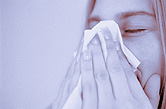- Could Artificial Sweeteners Be Aging the Brain Faster?
- Techniques for Soothing Your Nervous System
- Does the Water in Your House Smell Funny? Here’s Why
- Can a Daily Dose of Apple Cider Vinegar Actually Aid Weight Loss?
- 6 Health Beverages That Can Actually Spike Your Blood Sugar
- Treatment Options for Social Anxiety Disorder
- Understanding the Connection Between Anxiety and Depression
- How Daily Prunes Can Influence Cholesterol and Inflammation
- When to Take B12 for Better Absorption and Energy
- Epsom Salts: Health Benefits and Uses
Under-the-Tongue Hay Fever Pills Offer Little Benefit: Study


Under-the-tongue pills for hay fever sufferers provide little symptom relief and often come with bothersome side effects, new research finds.
Under-the-tongue, or sublingual, therapy is widely used in Europe as an alternative to allergy shots. In the United States, two such “immunotherapy” pills have been approved recently by the U.S. Food and Drug Administration for grass allergies.
For this study, Italian researchers looked at 25 clinical trials that evaluated the treatments’ effectiveness in reducing symptoms and the need for other allergy medications.
“The major finding here is that the benefit of SLIT [sublingual immunotherapy] tablets is very small, compared to placebo,” said Dr. Gabriele Di Lorenzo, of the department of internal medicine at the University of Palermo, who led the study. It was published online June 29 in JAMA Internal Medicine.
Di Lorenzo said some previous trials overestimated the drugs’ benefit because of the way differences between active medicine and placebo were calculated. For the new analysis, the researchers said the real difference was estimated correctly.
Many people with seasonal allergies — characterized by sneezing, itchy, watery eyes and congestion — get temporary relief from antihistamines and nasal corticosteroids. Allergy shots and sublingual therapy are different in that they expose the user to small amounts of allergen, in the hope of reducing allergic response over time.
Oralair, one of the drugs approved for use in the United States, includes freeze-dried extracts from the pollen of five grasses: Kentucky blue grass, orchard, perennial rye, sweet vernal and timothy. Another drug, Grastek, includes timothy extract.
In the analysis, when the pills were compared with placebo, symptom scores differed by just 1 point.
“Consider that the symptom score scale is 18 points,” Di Lorenzo said. “So, less than 1 point difference is not clinically significant. This means that the treatment alone is not sufficient to control symptoms.”
Study participants could also take allergy medicine, such as antihistamines, and this is what mainly controlled symptoms, Di Lorenzo said.
Side effects, reported by more than 61 percent of those taking the under-the-tongue pills, included swelling of the mouth, throat irritation and itchy skin. They were mostly mild to moderate, but some patients stopped the sublingual medicine because of them.
Di Lorenzo concluded that allergy injections at a doctor’s office, although less convenient and riskier, are more effective.
Referring to the concept of under-the-tongue allergy treatment, Dr. Gaston De Cardenas, ear, nose and throat chief at Nicklaus Children’s Hospital in Miami, said that “the idea is great.” However, ”they need to develop something that works better,” he said. De Cardenas was not involved in the study.
Doctors do have another alternative, said Dr. Jordan Josephson, an ear, nose and throat specialist at Lenox Hill Hospital in New York City. “It’s possible for a doctor to formulate sublingual drops to target a specific allergy,” he said.
Some doctors do this in their office, he said, while others send the prescription to a special compounding pharmacy. This type of off-label use is legal.
More information
For more about seasonal allergies, see the American Academy of Allergy Asthma & Immunology.
Source: HealthDay
Copyright © 2026 HealthDay. All rights reserved.










